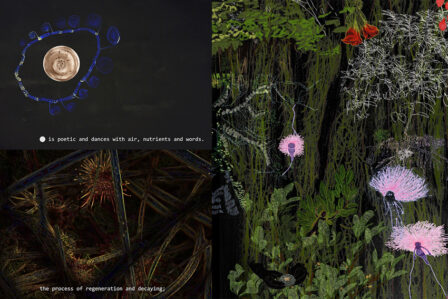Getting the most out of inhabiting the North of art/science by bringing in the bag the cosmopractices of the South

There is an immense accumulation of knowledge that comes from discomfort or friction, and that allows the emergence of discourses and practices that go halfway or beyond modern Western thought and the ancestral knowledge breathed in other lands. There is something in the discomfort or friction that allows for the experience – sometimes enriching, sometimes devastating – of inhabiting these two worlds simultaneously. Mutant methodologies and strange epistemologies emerge that we co-create with others to pollinate this space in-between: between human and more-than-human subjects, between fronte(x)ras, between rich ecosystems and contexts of extractivism and plunder… Within this in-between there is a series of dislocations and contrasts that are generated, and it is from there that we can redefine the current terricide and imagine how to inhabit it. This is where new ecosystems outside of ecowashing and witchwashing emerge. It’s also about conspiring to move away from narratives of pain while still telling what is happening, finding ways to tell what is happening from the river to the sea.
To discuss these and other issues, and in the context of the call Humedal II, we will have the visit of two admired artists: pantea and aniara rodado.
⬤
pantea
Day: Thursday, 16 January
Time: 6:30 pm
Venue: Former offices, Hangar
Free Admission
In an in-between space we meet and listen together, searching for the ⬤: a conversation about pantea’s ongoing learning process about and with wetlands, but also a space to listen with the sounds of the wetlands of northern and southern Iran. Fragments of sound, video and writing will be shared. We move from ab-bandans (آببـندان-ɑːb bændɑːn), a type of artificial wetland, an ancient method of water management and irrigation, to wetlands of resistance and the use of water as a weapon. We will reflect together on reclaiming that which moves between borders and defies categorisation. We will learn from wetlands to imagine absent histories, regeneration and other temporal rhythms.
Time is vast ⬤ and yet so limited. Time is the process of growth and ageing, of water and earth; the process of regeneration and decay; the process of events and silence. Time is the process of interaction by which ⬤ is brought into being. Time is between life and death, for ⬤ is an expression of transition. ⬤ lives within a record of accumulated time, the transition of land to ocean or ice to land. ⬤ is absent without the expression of others and flourishes as it grows with the expression of others. ⬤ is impermanence and thinks impermanently.
—
pantea is an Iranian multidisciplinary sound artist working with narratives of ecological and trans-human connection. She is passionate about the environment, plants and wetlands. Socially engaged, her practice also evolves from the commons and collective space, exploring with others and through thinking by doing, the possibilities of sound and listening. She is involved in collective projects such as Khamoosh – dedicated to the preservation and archiving of Iranian sound heritage, So – with Soundcamp – dedicated to live broadcasting and listening, and the MACBA Web Radio Working Group. He has performed and exhibited internationally in the UK, the Netherlands, Germany, Belgium, Croatia, Turkey, Iran and India.
Map-unravelling bodies: multiform and fluid southerlies
With aniara rodado
Day: Friday, 17 January
Time: 6:30 pm
Venue: Former offices, Hangar
Free admission
How to reveal the past and present epistemicides perpetrated by the hegemonic culture in divergent communities subjected to processes of subordination? How to imagine and build interspecies alliances in a hierarchical world where strategies of death prevail? Alliances are not fixed structures or predictable machines, but living soils, bioreactors of vital experimentation. They are spaces of encounter, exchange, justice and transformation, where gestures leave traces that open up new connections.
In Aniara’s work, these shifting and promiscuous territories, human and non-human bodies, plants, machines, substances and ‘minor’ technologies seek to coexist on the basis of pleasure. But creating these alliances also means confronting the decomposition and disappearance of beings and relationships, as life proliferates over our waste. This play of emergent forms and knowledges is born out of the common and the unstable, transforming notions of body, time and space, overflowing hierarchies and asking how humans and ecosystems reconstitute themselves by interweaving their histories outside the univocal narratives that limit our minds.
—
Choreographer, artist and researcher aniara rodado explores witchcraft and interspecific relations based on the plant world from a transhackfeminist and countercolonial perspective. Her choreographic practice aims to go beyond dance and the human body to question the ecological crisis, the techno-scientific fetishisation and the hegemonic powers that standardise ways of life, bodies, alliances and knowledge. Her performances, installations, texts, drawings, videos, dance pieces, etc. are created in open source, with a preference for old/low technologies and domestic DIY. aniara holds a PhD in science and art from the Ecole Polytechnique de Paris and teaches at the Ecole Supérieure d’Art d’Annecy-alpes (ESAAA).
Curated and accompanied in dialogue by Ce Quimera.
Right image: screenshot of the trailer for ⬤ (2022); pantea.
Left image: Fragment of the article in images Crema para volar-Memoria material de un epistemicidio; aniara rodado – Camille Olympie.
Categories: Agenda Hangar | Tags: wetlab
